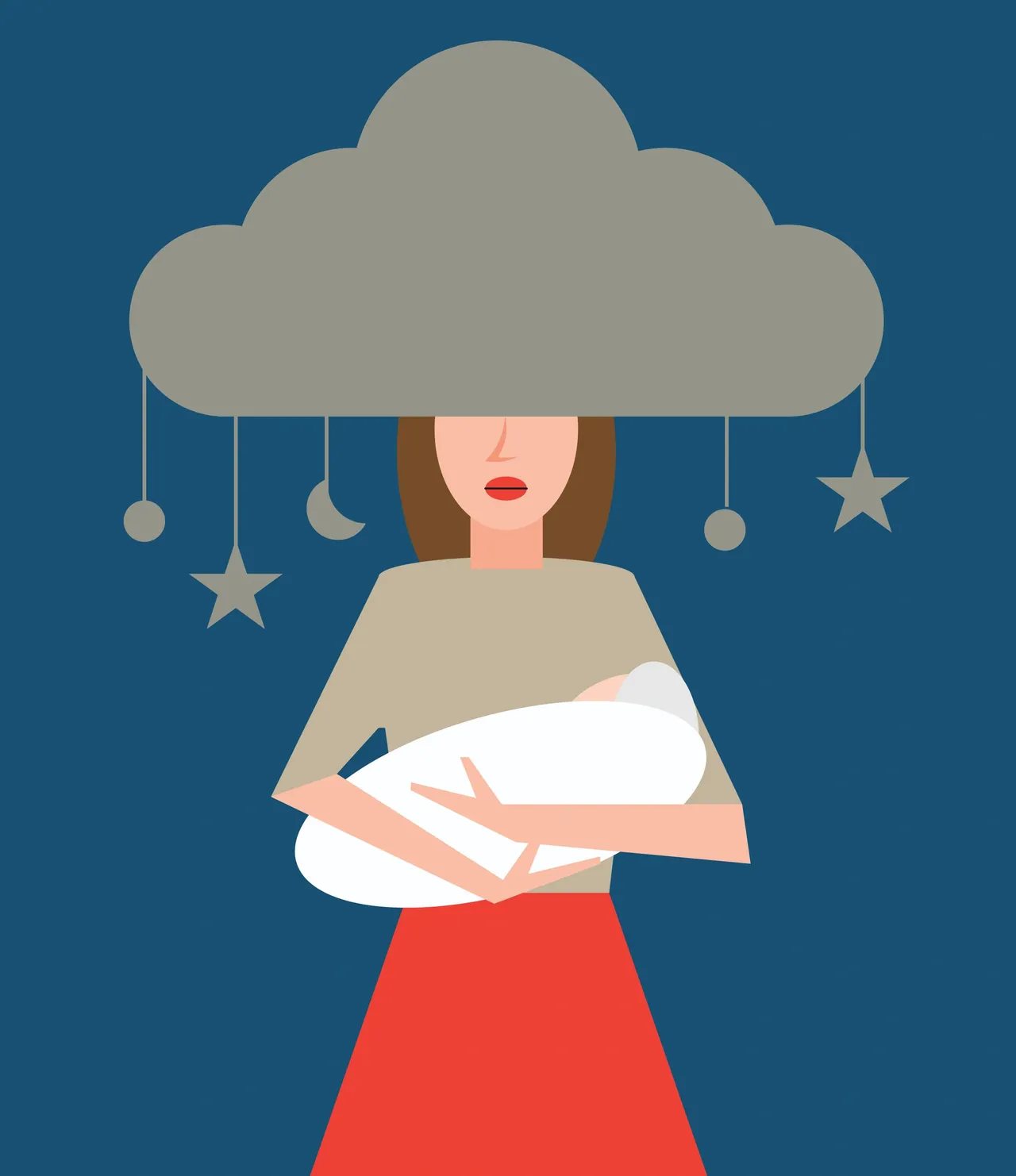It’s Tuesday and I’m here with a special blog post about maternal mental health. Previously, I featured Jenna Overbaugh, LPC, who wrote about her experience with postpartum OCD (click here to read). Today’s post is about postpartum depression and is written by one of my best friends (and favorite therapists), Rachael Parsons Svendsen, M.S., LMFT. Rachael has a private practice in Los Angeles, CA, where she works with families, youth, and adults, healing from attachment wounds. Her specialties include adoption, trauma, attachment, relationships, LGBTQ+, depression, and anxiety.
If you find yourself here, you are not alone (scroll to the bottom of this post for resources). Perinatal mood and anxiety disorders (PMADs) affect approximately 1/5 to 7 new or expectant mothers and approximately 1/10 new fathers. They are so common, that they are considered to be the #1 complication of pregnancy and childbirth. They’re the #1 complication, yet we still aren’t talking about or assessing/screening for them as much as we should be (for research, statistics, and additional information, please visit Postpartum Support International).
Rachael bravely shares about her experience with perinatal mood and anxiety disorders after her first and second pregnancies. She shares the dark thoughts and feelings that many moms live with every day, but are often too ashamed to talk about.
Here’s the story of one loving, bada** mama, who is breaking down barriers, as she sheds light on that darkness.
I sit in a dark room—white noise blasts from multiple sound machines; my arms hold my longed-for newborn sleeping son. I whisper to my friend on the phone that he is finally asleep, though I can still hear his phantom screams ringing in my mind. Each ghostly echo feels like knitting needles piercing my eardrums. I can’t relax. I can’t sleep. I eat, but my body rejects food. My weight plummets and my nerves seem frayed beyond repair.
I fantasize about us all dying in a car accident. If I die, my husband has to take care of the screaming tyrant. If my son dies, I would feel so guilty and responsible for wishing this hell to end. The only answer is for us all to die together.
After an especially intense panic attack in the car brought on by endless screaming, I share these fantasies with my husband. He admits he dreams of the same. At once terrified and validated, I dream of my baby dying to end the torment. I feel racked with guilt that I think these thoughts—thoughts about our sweet baby; the one we now have after a year of desperately trying—the one I love more than anything in this world.
I end each day comforted knowing that I did not cave in to the dark thoughts to throw the screaming baby across the room. Instead, I hold him, soothe him—nurse him, and rock him as he screams.
Days and weeks pass. He grows and things sort of get better. I never ask for help or get the diagnosis of a postpartum mood disorder, and instead, I suffer in silence; alone in the darkness.
I plow through, white-knuckling the torture of sleepless nights, days filled with holding and bouncing my baby to final pacification. I continue working as a Marriage and Family Therapist, and spend my days caring for others who need support in their family’s lives. At night, I come home to a crying baby who has waited for me to eat and sleep because he cannot be soothed by anyone else. No one seems to understand the endless storm. Even as an MFT, I do not recognize the reality of my own experience. No one talks about the postpartum period. No one talks about perinatal mood and anxiety disorders.
Fast-forward to my second child, three years later. My beautiful newborn baby becomes the object of torture for my oldest. Constant barrages of hitting, pinching, pushing, and tackling ignite a fear of his death at the hands of my oldest. I cry to my midwife at our postpartum visit, fearing that this new life will be snuffed out by the intense feelings and actions of my first-born. I am a failure—a fraud of a mother.
As the intoxicating cocktail of postpartum hormones subsides, I recognize the symptoms of postpartum mood disorders. I panic every time the newborn doesn’t sleep, when his nursing is interrupted by my oldest, and each time he is the recipient of aggression by my oldest. Feelings of dread incite; I want to run far away—away from here, away from the feelings of failure.
But this time, I ask for help. My OB-GYN prescribes medication for my anxiety and depression to alleviate my desire to run away, intrusive thoughts of my oldest accidentally killing the baby, sleepless nights, and lack of appetite. This helps, but the reality of living with one child, dysregulated since birth, weighs on me; heavy, in darkness.
So, I seek a diagnosis, something to make sense of our family’s lived reality for the past three years.
Sensory Processing Disorder, severe (SPD). All of a sudden, my life begins to make sense. The aggression, the anxiety, the screaming, the sleeplessness, the tantrums, the struggle with transitions, the huge feelings; all symptoms of SPD. Putting on the wrong pair of shoes, brushing teeth, getting dressed, cutting hair, washing hair, changes in routine, trimming nails, boredom, interrupted activities, all examples of catalysts for my son’s big feelings. I feel as though I now have a name for the pain, and with a name, comes hope for support.
I do not blame my oldest for my postpartum mood disorder. I also know that his SPD was a catalyst for the struggles I experienced stepping into parenthood and subsequently, parenting my second born.
Moving forward, I seek to validate the intensity with which my oldest experiences life, with the deep grounding that we are going to be OK as a family. I try to provide both my sons with the experience of safety, nurturing, and the love that they need. I do this as I simultaneously heal from a second round of postpartum anxiety and depression. I walk, run, breathe, practice yoga, take my meds, eat whole foods, talk to trusted friends, consult with professionals, and dream of a day when things are not so hard.
Things are not perfect, but they get better.
Parenting is not for the weak of heart. I regularly struggle with guilt because I tell myself, “At least my babies are healthy and I have a chance to parent them.” I know that others are not as lucky. I am infinitely grateful for the chance to parent these two boys who I love more than anything, while not pretending that it is easy. Just because parents are having a hard time, does not mean they don’t love their kids.
Parents, our children don’t need us to be perfect parents—they need us to be good enough ones. GOOD ENOUGH.
Fellow parents who are suffering, here are my words of hope: There is a name for the pain that you feel, and suffering in silence is not helpful. Postpartum mood disorders are common—you are not crazy, a bad mom, or less than if you experience one, AND, you do not have to continue feeling this way. Tell those you love how you feel. If they don’t get it, tell someone else until you find someone who does. Go to therapy. Get assessed. Take meds (if you need them). But most of all, please know you are not alone. You can make it through, even if you, too, sit in a dark room.
To learn more about Rachael and the impactful work she’s doing, connect with her on her website.
For maternal mental health resources, click here.
For immediate maternal mental health support, please call or text the Postpartum Support International (PSI) Helpline:
Call: 800-944-4773 (call, English/Spanish)
Text: 800-944-4773 (text, English)
Text: 971-420-0294 (text, Spanish)
Rachael, with eldest son, Theo

Written By Rachael Parsons Svendsen, M.S., LMFT


